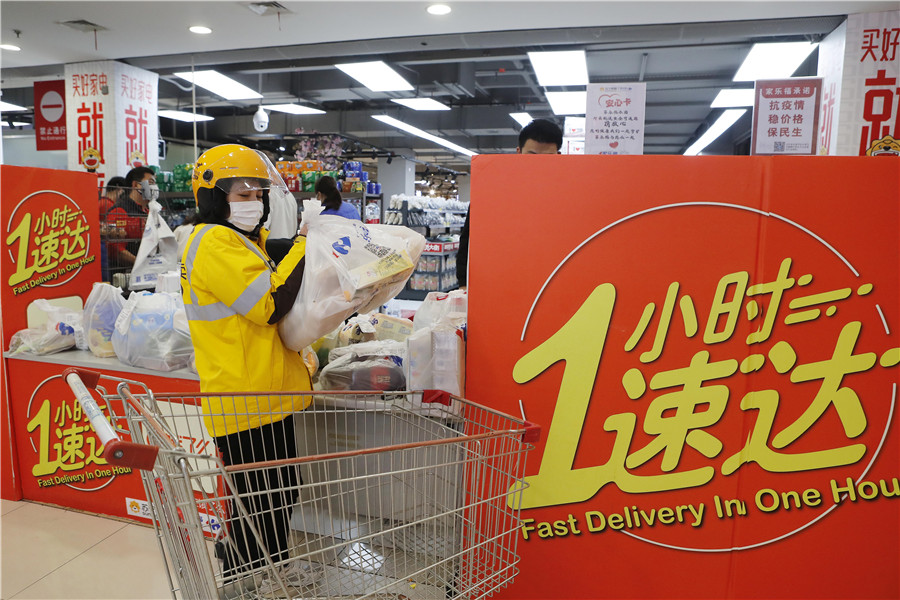Retailers striving to meet exploding demand for fresh food delivery


Sam's Club, the high-end membership stores of Walmart China, has experienced booming business in recent weeks supplying vegetables and other groceries to meet rising demand from local residents.
At this time, the supply of vegetables online is five times higher than the previous level on average, as orders from consumers who have to cook at home due to the coronavirus outbreak continued to rise.
Its processing plant staffers sometimes sleep three to four hours a day, with trucks delivering every two or three hours to the clubs from the processing plants. The delivery frequency was three times daily before the epidemic struck.
One of the solutions for Sam's Club is to expand their vegetable processing capacity. Sam's Club's 26 outlets spread across 20 cities in the country normally receive vegetables from 28 processing factories in 18 cities.
Sam's Club has added three such factories in Wuhan, capital of Hubei province, and in Hunan and Liaoning provinces.
To ensure supplies in Wuhan, the epicenter of the outbreak, one of its suppliers' transit warehouses was turned into a processing factory in one day thanks to the support of their suppliers.
"Quality and food safety are the two primary criteria when people buy groceries today. And bulk-sized products are preferred. That is why we are seeing continuous demand from our members," said Leon Song, senior director of fresh products at Sam's Club China.
A report by Bain & Co on China's Retailers and the Coronavirus Outbreak has found that retailers are working around the clock in hard-hit areas of China.
The report has found two looming challenges for these retailers.
One is logistical bottlenecks since transport routes are severely disrupted by the closure of cities for quarantine purposes, with many warehouses and logistics personnel unable to come to work because of illness or restrictions on movement.
The second challenge would be imminent supply shortages linked to uncertainty about when factories will be able to resume production.
Jonathan Cheng, who leads Bain & Co retail practice in China, said: "The epidemic has so far accelerated the shift from traditional store-based selling to purely digital or omni channel retailing."
On a related matter, Carrefour China has further connected with Suning's online retail application, which enables the firm to deliver products rapidly and reach more customers.
The Nanjing-based home-appliance merchant-turned-retailer acquired an 80 percent stake in Carrefour China last year. The most noticeable benefit since the acquisition was when Suning started to sell its home appliance products at Carrefour's hypermarkets.
The epidemic has also pushed up the demand for fresh goods and daily necessities, offering more opportunities to merge Carrefour's businesses into Suning's online network.
Carrefour's consumers who live within 5 kilometers of the stores can receive their purchases through Suning's application in one hour. Those living within 16 km of the Carrefour store are expected to receive their purchases in 12 hours.
Suning's logistics team serves as the delivery end for Carrefour, according to Carrefour China.
Bain's report showed that ecosystem players are unlikely to suffer long-term damage from the coronavirus outbreak.
Dynamic traditional retailers with a significant national or international presence are financially capable of withstanding the short-term disruption of the coronavirus. Regional retail chains do not have the same capacity to absorb those financial shocks, it added.




































